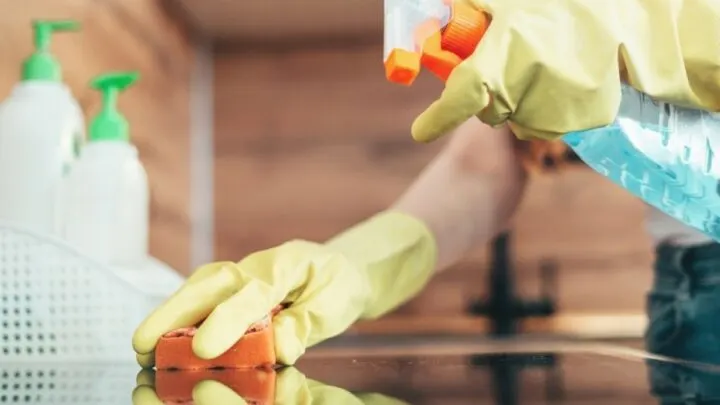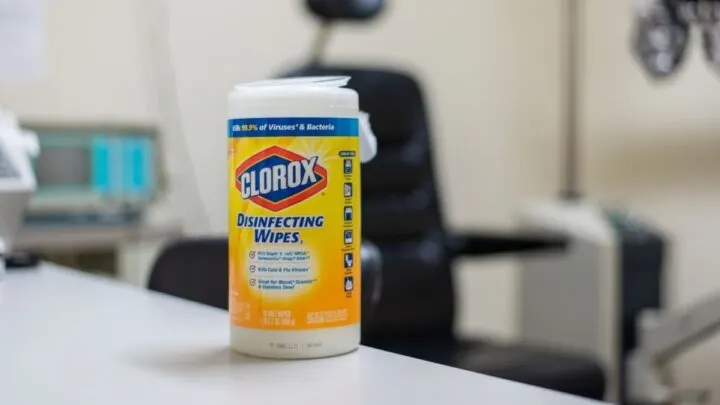White quartz countertops in the kitchen are a timeless classic.
Apart from that classy look, if maintained properly, they give a clean and new look to the kitchen for many years.
Even though quartz countertops are known for being low maintenance, easy to clean, and stain-resistant because of their non-porous surface, it doesn’t mean they are indestructible.
Cleaning white quartz countertops is simple. You can just take a soft sponge and clean the top with some diluted dishwashing liquid. As long as you protect the countertops from heat and harsh chemicals, they should stay beautiful for a long time.
If you clean the countertops regularly, it is unlikely to get messes that are hard to clean.

White Quartz Countertop Cleaning
White quartz countertop cleaning can be difficult if you do not establish a cleaning routine.
This is because a caked-on mess is likely to leave stains on the countertop as well as damage the smooth non-porous surface of the quartz.
At times, food on the countertop that has dried off might also be hard to clean and leave stains.
However, the best way to clean such caked-on messes is to use a non-abrasive spray on the surface, let it sit for a few minutes, then clean it off.
Make sure you use a bleach-free cleaner so that the quartz countertop does not lose its shine.
Bleach-based cleaning agents also lead to discoloration or dulling of the surface which means that the countertops will start looking old and worn out quite quickly.
How to Protect White Quartz Countertops
Apart from a cleaning routine, it is also important to protect the quartz countertop so it doesn’t stain and remains as good as new over the years.
1. Protect from Heat Sources
Some bad practices like putting heated crackpots on the kitchen countertops and heat sources like curling irons and flat irons on the quartz countertop in the bathroom result in discoloration and dullness.
If you want to put heated pots on the countertop, make sure you place them over a trivet or a pad and not directly on the surface.
2. Protect from Methylene Chloride
Another set of chemicals that you need to avoid getting spilled on your quartz countertop is anything with methylene chloride.
This chemical is used for degreasing and metal cleaning. However, it is very abrasive and strips of paint can corrode the quartz countertop.
3. Protect from Abrasive Chemicals and Degreasers
So, avoid using abrasive oven cleaners and degreasers on the quartz countertop surface. Also, avoid using oil-based soaps for cleaning the countertops.
If your white quartz countertop is in the bathroom, make sure you are careful when using nail polish removers around there as it is likely to stain the countertop.
Since these stains are made from abrasive chemicals, these stains cannot be removed.
4. Protect from Trichloroethane
Trichloroethane is also a substance that is used to remove oil, grease, and paint, and also to dissolve glue.
This chemical is also very damaging to the countertops. So, if you are doing a paint job around the area, make sure you cover the countertops before placing any chemical bottles on top as even a little can cause discoloration and dullness to the quartz.
5. Protect from Permanent Markers and Ink
Another obvious thing that may stain the quartz countertop is permanent markers or ink on the surface.
If you have kids around the house, make sure they don’t write anything on the countertops as it may cause permanent staining to the quartz.
6. Protect from Citric Acid
Countertops might seem like a germ-free clean surface to cut up your vegetables on.
However, they may also stain the surface as they contain natural pigments.
For example, cutting up spinach over your white countertop directly might cause it to stain green.
Furthermore, cutting up lemons and oranges over the countertop might seem harmless, but the citric acid in them can cause white spots to appear on the quartz surface which does not go away.
Citric acid eats upon the polish of the countertop which also causes dullness if not any stains.
So, even if you think that slicing a lemon in half over the countertop directly won’t do any harm, think again.
The juice from the lemon, even if a little will react with the surface and cause spots and dullness.

Can You Use Clorox Wipes on Quartz Countertops?
While using dishwasher liquid on a small sponge is a great everyday cleaner, using Clorox wipes for the quartz countertops is also a good idea.
These disinfecting wipes are great for cleaning the surface since they are bleach-free.
However, they are not to be used frequently, as these wipes contain citric acid that may damage the countertop polish. So, occasional use is fine, but using it as an everyday cleaner is not a good practice.
How to Remove Stains From White Quartz Countertops
While stains like those made from permanent markers and citric acid are unlikely to go away, those made from food spills can be removed.
However, unlike other surfaces, quartz countertops cannot be cleaned with degreasers, detergent, and harsh cleaners that contain bleach.
The best way to clean the countertop and remove stains is using a gentle soap-like dishwashing liquid.
Stubborn stains and messes can be cleaned with non-abrasive cleaners that do not contain bleach, methylene chloride, or trichloroethane.
But protecting the countertop is better than looking for stain removers, so make sure you are not engaging in any practices that cause stains on the countertops or are not exposing it to any harsh chemicals and cleaners.
Summing Up Cleaning White Quartz Countertops
White quartz countertops are a great addition to kitchens and bathrooms. It gives an exquisite look to the place if kept clean and stain-free.
Even though quartz countertops are easy to clean with non-abrasive cleaners, stubborn messes and spills might have you thinking about whether you can use an oven cleaner or a bleach-based cleaning agent to wipe off the surface and get rid of the stains.
Since quartz countertops are as good as the shine on the surface, it is recommended to protect the countertop from harsh chemicals and cleaning agents.


